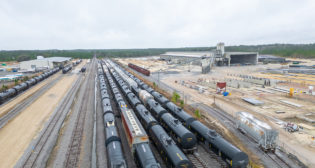
Canada Launches National Supply Chain Office
Written by Marybeth Luczak, Executive Editor
“The National Supply Chain Office will enhance the resilience, efficiency and reliability of our transportation systems,” Canada’s Minister of Transport Pablo Rodriguez said Dec. 1. “This is one of many initiatives by the government of Canada to reduce congestion throughout the transportation supply chain, benefiting Canadians across the country.”
Transport Canada on Dec. 1 reported that Assistant Deputy Minister Robert Dick will lead its new National Supply Chain Office, whose aim is “to strengthen Canada’s supply chains and increase the economy’s competitiveness.”
The Office’s formation builds on the recommendations in the final report submitted by the National Supply Chain Task Force to the Minister of Transport on Oct. 6, 2022, according to the government. Among the other 20 actions recommended in the report were easing port congestion; addressing labor shortages and employee retention; protecting corridors, border crossings and gateways from disruption; developing a national transportation Supply Chain Strategy; and engaging the U.S. and the provinces and territories to achieve mutual recognition of regulations, polices and processes.
The National Supply Chain Office will be established with an investment of C$27.2 million from Canada’s Budget 2023. In consultation with industry, labor, Indigenous groups and other levels of government, the Office “will work to increase efficiency and resiliency across our supply chains,” Transport Canada reported. Specifically, it said the Office will:
- Develop and implement a National Supply Chain Strategy “to identify priorities and support collaborative action to improve Canada’s supply chains.”
- Support the federal government’s efforts in responding “to significant supply chain disruptions, such as those related to extreme weather and labor disputes.”
- Support data sharing “so that goods can move more efficiently, as well as facilitate strategic policy, regulatory and investment decisions by governments and industry.”
- “[P]rovide overarching leadership and coordination, foster collaboration, and conduct external outreach with regard to interprovincial/territorial and global supply chain issues.”
“The strength of our transportation supply chains is directly related to the cost of living,” said Minister of Transport Pablo Rodriguez, who this summer succeeded Omar Alghabra as agency leader. “The National Supply Chain Office will enhance the resilience, efficiency and reliability of our transportation systems. This is one of many initiatives by the government of Canada to reduce congestion throughout the transportation supply chain, benefiting Canadians across the country.”
According to Transport Canada, the Office can be reached at [email protected].



